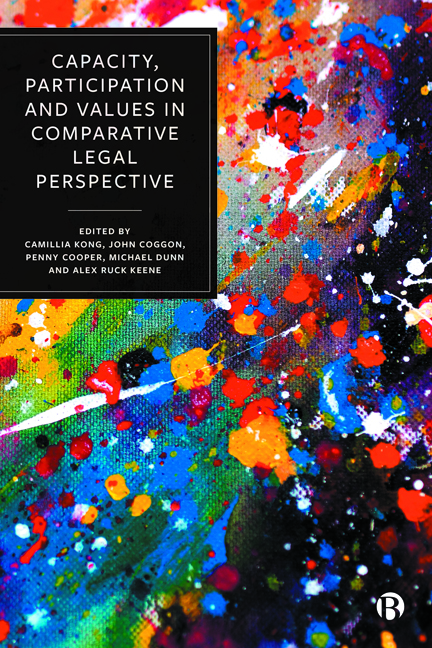Book contents
- Frontmatter
- Contents
- List of Tables and Boxes
- Notes on Contributors
- Acknowledgements
- 1 Introduction: Values, Participation and Mental Capacity Laws in International Comparative Perspective
- 2 Mental Capacity Law in England and Wales: A Value-Laden Jurisdiction
- 3 Mental Capacity Regimes Approach to Values and Participation in Proceedings Involving Individuals with Impaired Decision-Making Capacity in Scotland
- 4 The Fusion Approach to Mental Capacity Law in Northern Ireland: Possibilities and Challenges
- 5 Judging Values in a Time of Transition: An Irish Perspective
- 6 US Laws Relating to Decision-Making on Behalf of P
- 7 Indigenous Peoples with Disabilities and Canadian Mental Capacity Law
- 8 Capacity, Participation and Values in Australian Guardianship Laws
- 9 Navigating Values in Aotearoa New Zealand
- 10 Values and Participation of Individuals Without Mental Capacity in Hong Kong
- 11 Asian Values and Confucianism: How P’s Ability to Participate in Court Proceedings in Singapore Is Influenced by P’s Cultural Milieu
- 12 Respect for the Will and Preferences of People with Mental Disorders in German Law
- 13 The Place of Values and P’s Participation in Mental Capacity Law: Themes, Synergies and Tensions
- Index
9 - Navigating Values in Aotearoa New Zealand
Published online by Cambridge University Press: 18 January 2024
- Frontmatter
- Contents
- List of Tables and Boxes
- Notes on Contributors
- Acknowledgements
- 1 Introduction: Values, Participation and Mental Capacity Laws in International Comparative Perspective
- 2 Mental Capacity Law in England and Wales: A Value-Laden Jurisdiction
- 3 Mental Capacity Regimes Approach to Values and Participation in Proceedings Involving Individuals with Impaired Decision-Making Capacity in Scotland
- 4 The Fusion Approach to Mental Capacity Law in Northern Ireland: Possibilities and Challenges
- 5 Judging Values in a Time of Transition: An Irish Perspective
- 6 US Laws Relating to Decision-Making on Behalf of P
- 7 Indigenous Peoples with Disabilities and Canadian Mental Capacity Law
- 8 Capacity, Participation and Values in Australian Guardianship Laws
- 9 Navigating Values in Aotearoa New Zealand
- 10 Values and Participation of Individuals Without Mental Capacity in Hong Kong
- 11 Asian Values and Confucianism: How P’s Ability to Participate in Court Proceedings in Singapore Is Influenced by P’s Cultural Milieu
- 12 Respect for the Will and Preferences of People with Mental Disorders in German Law
- 13 The Place of Values and P’s Participation in Mental Capacity Law: Themes, Synergies and Tensions
- Index
Summary
Introduction
Introduction and outline
New Zealand is increasingly also referred to by its te reo Māori name, Aotearoa. This social development, not unusual in postcolonial jurisdictions, is mirrored in legal developments, ranging from the status of te reo Māori as an official language (along with New Zealand Sign Language), to adding the name ‘the Oranga Tamariki Act’ to the child welfare statute originally called just the Children's and Young People's Well-Being Act 1989, to the passing of Te Awa Tupua (Whanganui River Claims Settlement) Act 2017, which grants legal personality to the river in question to accord with Māori notions. These statutes also contain statements of values or principles that reflect these notions: s 13 of Te Awa Tupua (Whanganui River Claims Settlement) Act 2017 sets out the values that represent the essence of the river, including its links with the iwi and hapū of the area. Similarly, s 4 of the Oranga Tamariki Act 1989 identifies its purposes as promoting the ‘wellbeing of children, young persons, and their families, whānau, hapū, iwi, and family groups’, including through ‘culturally appropriate’ services. Taking the legislature to intend what is commonly understood, ‘iwi’ and ‘hapū’ are, respectively, the different nations of Māori and the smaller sub-tribes into which each iwi is split; and ‘whānau’ is an extended family.
This reflects cultures coalescing. The 2018 census6 indicates that the country has four major ethnic identifiers, namely European (70 per cent), Māori (16.5 per cent), Asian (15 per cent) and Pacific peoples (8 per cent): this adds to more than 100 per cent because of those who are culturally mixed.7 The legal framework for capacity law is reflective of this. At a broad brush level, there are laws that reflect Anglo-Saxon traditions, but often with modifications that accommodate a more collective approach found in South Pacific and Asian traditions. This chapter seeks to explore that by, first, setting out as part of the introductory section the constitutional and human rights framework
- Type
- Chapter
- Information
- Publisher: Bristol University PressPrint publication year: 2023



